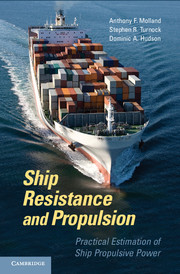Book contents
- Frontmatter
- Contents
- Preface
- Nomenclature
- Abbreviations
- Figure Acknowledgements
- 1 Introduction
- 2 Propulsive Power
- 3 Components of Hull Resistance
- 4 Model-Ship Extrapolation
- 5 Model-Ship Correlation
- 6 Restricted Water Depth and Breadth
- 7 Measurement of Resistance Components
- 8 Wake and Thrust Deduction
- 9 Numerical Estimation of Ship Resistance
- 10 Resistance Design Data
- 11 Propulsor Types
- 12 Propeller Characteristics
- 13 Powering Process
- 14 Hull Form Design
- 15 Numerical Methods for Propeller Analysis
- 16 Propulsor Design Data
- 17 Applications
- Appendix A1 Background Physics
- Appendix A2 Derivation of Eggers Formula for Wave Resistance
- Appendix A3 Tabulations of Resistance Design Data
- Appendix A4 Tabulations of Propulsor Design Data
- Index
- References
5 - Model-Ship Correlation
Published online by Cambridge University Press: 07 September 2011
- Frontmatter
- Contents
- Preface
- Nomenclature
- Abbreviations
- Figure Acknowledgements
- 1 Introduction
- 2 Propulsive Power
- 3 Components of Hull Resistance
- 4 Model-Ship Extrapolation
- 5 Model-Ship Correlation
- 6 Restricted Water Depth and Breadth
- 7 Measurement of Resistance Components
- 8 Wake and Thrust Deduction
- 9 Numerical Estimation of Ship Resistance
- 10 Resistance Design Data
- 11 Propulsor Types
- 12 Propeller Characteristics
- 13 Powering Process
- 14 Hull Form Design
- 15 Numerical Methods for Propeller Analysis
- 16 Propulsor Design Data
- 17 Applications
- Appendix A1 Background Physics
- Appendix A2 Derivation of Eggers Formula for Wave Resistance
- Appendix A3 Tabulations of Resistance Design Data
- Appendix A4 Tabulations of Propulsor Design Data
- Index
- References
Summary
Purpose
When making conventional power predictions, no account is usually taken of scale effects on:
Hull form effect,
Wake and thrust deduction factors,
Scale effect on propeller efficiency,
Uncertainty of scaling laws for appendage drag.
Experience shows that power predictions can be in error and corrections need to be applied to obtain a realistic trials power estimate. Suitable correction (or correlation) factors have been found using voyage analysis techniques applied to trials data. The errors in predictions are most significant with large, slow-speed, high CB vessels.
Model-ship correlation should not be confused with model-ship extrapolation. The extrapolation process entails extrapolating the model results to full scale to create the ship power prediction. The correlation process compares the full-scale ship power prediction with measured or expected full-scale ship results.
- Type
- Chapter
- Information
- Ship Resistance and PropulsionPractical Estimation of Propulsive Power, pp. 85 - 96Publisher: Cambridge University PressPrint publication year: 2011
References
- 1
- Cited by



